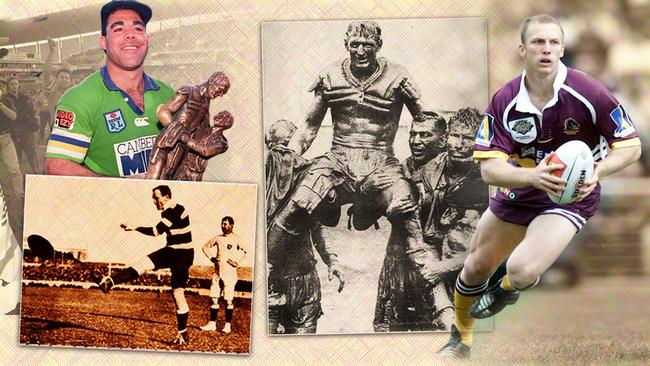Paul Kent: The ins and outs of the process of becoming a rugby league Immortal
AS rugby league’s most exclusive club prepares to welcome two more members, PAUL KENT looks at the men most likely to enter and the history of the concept.

STATISTICS and exorbitant truths get the full workout.
There has been much misinformation about the Immortals concept. Mostly about what it is and how it should be judged.
The Immortals concept is as simple as naming rugby league’s best player.
Secondary matters, like statistics and records, were never supposed to count as much as the talent of the player during his era.
INJURY: Keary out for a month
MATES: Friends turn rivals with top spot on the line
Coaching records and criminal records are not to be considered.
That is why the original judges refused to consider anybody they did not see play. So only careers after World War II were considered.
There the four judges hired themselves a hotel room and began with a list of rugby league’s best 100 since the war and they whittled it down one by one until just five were left.
There they remained deadlocked for eight hours.

The meeting went through the night.
That has all changed now the NRL has taken over the award and, rightfully, expanded it to take in the game’s entire history.
The voting process has changed, too.
The judges will meet at League Central and debate the merits of each player until, once they have bludgeoned each other into submission, each will take a small walk from the meeting room into another small room where they will cast their vote, alone, according to their conscience.
It is a much more civil process than the past.
It got dirty at the last vote when Andrew Johns was named as the eighth Immortal.
Whenever Johns’ name was mentioned during the last voting process Graeme Langlands, by then an Immortal himself and a strong supporter for Norm Provan to be the eighth, leaned back in his chair and yelled “Drugs!”

It took Bob Fulton, also an Immortal and one of the few men Langlands respected, to remind Langlands that off-field behaviour was not a criteria and that perhaps not everybody would have liked incidents from their past to be raised.
Langlands took the tip.
Johns almost paid the price for admitting after his retirement that he took recreational drugs during his career.
They were not performance enhancing, in the manner used, so had no effect on how he played the game and the judges eventually voted that way.
They regarded his influence as second to none and he became the eighth.
Each candidate can have his career boiled down to one bold claim.
Dally Messenger was man most responsible for rugby league’s success when he switched from rugby union.

Frank Burge scored 146 tries in 154 games and held rugby league’s tryscoring record for a forward until overtaken by Steve Menzies, who needed an extra 110 games.
Norm Provan won 10 premierships as a player. Nobody else has more than eight.
Mal Meninga is the only man to play in four Kangaroos tours.
Ron Coote played in nine grand finals over 11 years.
Darren Lockyer holds the record for most Kangaroos appearances with 63.
Ken Irvine still holds the record for most tries, with 212.
Dave Brown once scored 45 points in a match.
Brian Bevan scored 796 tries in a career spanning 688 games.
Duncan Hall played for Queensland and Australia in his first year in Brisbane club football and dominated his era.
The smart money says Dally Messenger will be the first to be Immortalised.
Messenger is eligible for the first time in this voting process.
More than 100 years later his name is still known to almost every rugby league fan and there is little doubt he looms largest from the pre-war era, although the snapshots of several others will also be hard to ignore.
There is a belief around that the NRL will privately insist at least one player from the modern era must be chosen. This ensures a living pulse on stage on the night.
To do so, though, would unfairly skew the voting in favour of the living candidates, Provan, Coote, Meninga and Lockyer.

On Monday, former judge and Rugby League Week editor Geoff Prenter said he believed his omission from today’s voting panel was part of a conspiracy to deny Provan Immortal status.
But there might be legitimate reasons.
Provan missed being named when the original Immortals (Clive Churchill, Johnny Raper, Reg Gasnier and Bob Fulton) were named in 1981. He missed again when the next two (Langlands and Wally Lewis) were named in 1999.
He missed again when Arthur Beetson was named in 2003. And again when Johns was named in 2012.
How many times do they go back to Provan?
That is for the judges to consider.
Whoever is named, the NRL’s decision to use multiple judging panels (of which I was one to reduce the 92 eligible players to the shortlist of 10), with a transparent, fair voting process, is the best to deliver the most worthy next Immortals.
Yet whoever is named will still stir debate.
It is, after all, rugby league.
Originally published as Paul Kent: The ins and outs of the process of becoming a rugby league Immortal


